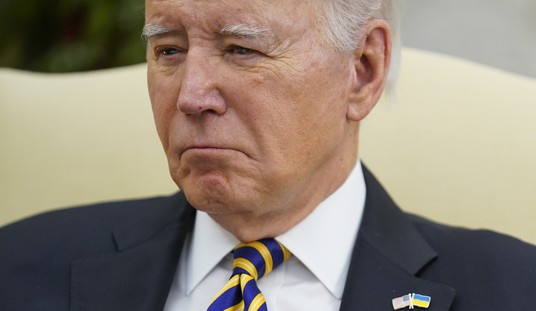The Washington Post could be echoing Spock. “Bridge to Captain, an unclassified object has been detected at the limit of sensor range. It appears to be headed this way.” The pundits don’t know what it is, but in any event, they are reporting an extreme anomaly on the political scene. It has a name: the Campaign for Primary Accountability.
In two Ohio congressional primaries Tuesday, a Texas-based group spent almost $190,000 supporting a pair of candidates who could not be more different: a tea party conservative and a liberal icon, Rep. Dennis J. Kucinich (D-Ohio).
The group’s enemy is incumbency — of any ideological stripe, anywhere in the country. The Campaign for Primary Accountability, founded by the son of a Houston construction magnate, is targeting longtime incumbents in House districts that are otherwise safe for their party. Group leaders say these long-term lawmakers who face scant competition have created a “permanent political class” that has poisoned politics …
The group was one for two on Tuesday night. Republican Brad Wenstrup — a veteran of the Iraq war who had never held office — scored a surprise victory over Rep. Jean Schmidt (R) with the group’s help. But Kucinich lost in a redrawn northern Ohio district to Rep. Marcy Kaptur, another Democratic incumbent.
Group leaders said they will target numerous incumbents — and they appear to have the power to do it. At the end of January, the super PAC had collected nearly $1.9 million, according to reports with the Federal Election Commission, and $1.6 million of that came from just four mega-donors who wrote six-figure checks. Linbeck, who works for his father’s company and has others of his own, has given at least $775,000.
If Victor Hugo described the French Revolution as “an idea with a sword” in America the equivalent appears to be “money with a mission”. Something is out there taking down incumbents. And for a reason. In the Campaign for Primary Accountability’s view the real divide isn’t between Republican and Democrat. It is between the people and entrenched political class in Washington.
The Washington Post says, “the next target for the new super PAC is Rep. Spencer Bachus (R-Ala.), chairman of the Financial Services Committee, who is under an ethics investigation for stock trades he made during the 2008 financial crisis.” Bachus claims he’s innocent and that even a former SEC official believes him. But the problem, as Bachus himself realizes, is that it almost doesn’t matter. His biggest negative, he told reporters, is that “he’s in Congress.”
Although the Washington Post correctly points out that compared to billion dollar scale on which American politics operates even the resources of the CPA are a drop in the bucket, its strategists, who are based in Houston, have a couple of trump cards. The first is they get a lot of bang for buck. Since many incumbents have never faced a serious primary challenge they are comparatively vulnerable in that arena. As the Washington Post writes, “house primaries are small-scale affairs and a modest ad campaign can be pivotal, especially one that comes just before Election Day.” So idea is to find the weaklings and drop them, not by shooting at their frontal armor in Washington, where the glacis plate thick as K Street, but back home, where it is much thinner.
But the biggest danger that CPA poses is that the idea it espouses that might spread. My pamphlet Storming the Castle picked up on emerging core concepts as people as diverse as Jenny Beth Martin, Leo Linbeck, Eric O’Keefe and others groped toward towards a strategy.
The problem came down to inflows and outflows. Government spent too much. As the Congressional Budget Office put it, the only way to keep spending was to sell off the country …
The election of Barack Obama was seen by some as a catastrophe that would send America over the financial cliff. But his election could also be regarded not as departure from American history but the culmination of a long trend toward bigger government. Obama was simply the latest candidate from the Party of Incumbency, and probably not the last.
“How could a person like Barack Obama become President,” his detractors wondered aloud. Yes, he stood on the shoulders of giants – the giants of government expansion, that is. It was less accurate to describe him as the nation’s first “black President” than the nation’s first unabashedly special-interest President. A creature of the big unions, of leftist-welfare politics, and yet ironically, of crony-capitalists too.
The nation had arrived at Obama only after the political forces which engendered him had completed their long march through the institutions. What Lloyd, Martin, Althouse, Linbeck, Ryan … discovered, first to their surprise and later to their horror, was that this moment now. The crisis had arrived and they had no choice but to confront the problem of bloated government now…
The constituencies of entitlement had dug themselves in so deeply that in government at least it resembled one massive entrenchment, each part as heavily fortified as the other. There was no soft interior defended by a thin crust. It was solid as a rock.
Yet, therein, Linbeck felt, was its weakness. Government had settled so solidly on the taxpayers’ wallet that it would starve without it. The sheer size of government was now working against it. The bureaucracies had drained the surrounds of sustenance and now, they were on the point of either finding new prey or cannibalizing each other to survive.
Linbeck’s strategy was simple. His idea was to raise up the taxpayers, the disenfranchised middle class and poor, by chipping away at the growth of giant government in the states, at the extremities. There the Party of the Incumbency was at its weakest. There, amid the daily life of ordinary citizens, common sense was still watered by reality. …
What buoyed up everyone, from congressmen to citizens-turned activists was the sense that the urgency was finally shared. People seemed to know what you were talking about before you spoke. The forest floor was covered with a kind of tinder. It was, to paraphrase Dickens, the best of times and the most dangerous of times.
These ideas were among many floating around in the crisis that was obviously gripping America; a crisis for which people groped for an answer. Little did I know when I wrote those words how soon some of these tentative ideas would translate themselves into action.
When the Tea Party first appeared on the scene the Establishment in their disdain sent comedians out to disparage them. They’re not doing that anymore. Not because nobody’s laughing but perhaps because is finally occurred to them that it to the Castle that the clowns have returned.
When sounds travel far and wide,
A stormy day will betide.
How to Publish on Amazon’s Kindle for $2.99
The Three Conjectures at Amazon Kindle for $1.99
Storming the Castle at Amazon Kindle for $3.99
No Way In at Amazon Kindle $3.99, print $9.99









Join the conversation as a VIP Member